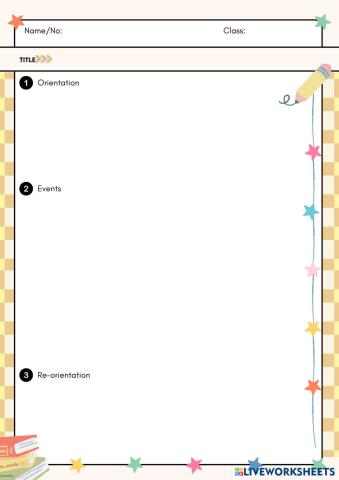-
English Language
-
High School
-
10th grade
-
Writing
-
English
Author's Instructions
📝 Student Instruction: Future Continuous Tense
- When do we use Future Continuous?
-
To talk about an action that will be happening at a specific time in the future.
- I will be studying at 8 p.m.
-
To describe an action that will be in progress when another event happens.
- She will be cooking when you arrive.
-
To politely ask about someone’s plans.
- Will you be using the computer tonight?
- Form
-
Affirmative (+): Subject + will + be + verb+ing
- I will be playing football tomorrow afternoon.
- They will be watching a movie at 9 p.m.
-
Negative (–): Subject + will + not (won’t) + be + verb+ing
- I won’t be sleeping at that time.
- She won’t be attending the meeting.
-
Question (?): Will + subject + be + verb+ing
- Will you be studying at 7 p.m.?
- Will they be traveling next week?
- Time expressions often used
- at this time tomorrow / tonight / next week
- at + specific time → at 5 p.m., at 9 o’clock
- when → when you arrive, when the party starts
- Examples
- This time next week, I will be lying on the beach.
- Will you be waiting for me at the station?
- She won’t be working during the holiday.
👉 Practice Example:
Change the verb into Future Continuous.
- I (study) at 8 p.m. tomorrow. → I will be studying at 8 p.m. tomorrow.
- She (not cook) when we arrive. → She won’t be cooking when we arrive.
- (you / travel) next week? → Will you be traveling next week?
-
English Language
-
High School
-
10th grade
-
Writing
-
English
Author's Instructions
📝 Student Instruction: Future Continuous Tense
- When do we use Future Continuous?
-
To talk about an action that will be happening at a specific time in the future.
- I will be studying at 8 p.m.
-
To describe an action that will be in progress when another event happens.
- She will be cooking when you arrive.
-
To politely ask about someone’s plans.
- Will you be using the computer tonight?
- Form
-
Affirmative (+): Subject + will + be + verb+ing
- I will be playing football tomorrow afternoon.
- They will be watching a movie at 9 p.m.
-
Negative (–): Subject + will + not (won’t) + be + verb+ing
- I won’t be sleeping at that time.
- She won’t be attending the meeting.
-
Question (?): Will + subject + be + verb+ing
- Will you be studying at 7 p.m.?
- Will they be traveling next week?
- Time expressions often used
- at this time tomorrow / tonight / next week
- at + specific time → at 5 p.m., at 9 o’clock
- when → when you arrive, when the party starts
- Examples
- This time next week, I will be lying on the beach.
- Will you be waiting for me at the station?
- She won’t be working during the holiday.
👉 Practice Example:
Change the verb into Future Continuous.
- I (study) at 8 p.m. tomorrow. → I will be studying at 8 p.m. tomorrow.
- She (not cook) when we arrive. → She won’t be cooking when we arrive.
- (you / travel) next week? → Will you be traveling next week?
Explore Worksheets
KIẾN TRÚC - ĐIÊU KHẮC
- English Language
- 10th grade
Grammar:Tenses
- English Language
- 10th grade
Worksheet 1
- English Language
- 10th grade
Procedure Text
- English Language
- 10th grade
















